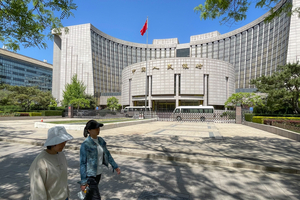Commentary: What the PBOC’s Trading of Government Bonds Will Mean for Monetary Policy
Listen to the full version

A line from President Xi Jinping’s comments on monetary policy revealed in a recently published book — “[we need] to enrich the monetary policy toolkit, supporting the central bank in gradually increasing its buying and selling of government bonds in open market operations” — has sparked heated discussions.
In response, the People’s Bank of China (PBOC) said its trading in government bonds in the secondary market could be used for liquidity management or as a monetary policy tool. The central bank noted that it could either buy or sell sovereign debt, depending on the policy target as well as market supply and demand. As such, it is clear that the central bank’s trading is not equivalent to quantitative easing.

Unlock exclusive discounts with a Caixin group subscription — ideal for teams and organizations.
Subscribe to both Caixin Global and The Wall Street Journal — for the price of one.
- DIGEST HUB
- President Xi Jinping suggested enhancing monetary policy through increased central bank activity in government bond trading, stirring debate.
- The People’s Bank of China (PBOC) clarified these operations aim at liquidity management, not quantitative easing.
- Such trading affects the PBOC's balance sheet and monetary policy signals, requiring further observation on interactions between monetary and fiscal policies.
President Xi Jinping's comment urging an enhancement of the monetary policy toolkit, specifically advocating for the People's Bank of China (PBOC) to increase its buying and selling of government bonds, has sparked significant discussion [para. 1]. In response, the PBOC clarified that its operations involving government bonds in the secondary market are for purposes of liquidity management and not akin to quantitative easing [para. 2]. This distinction acknowledges the PBOC's actions within the realm of both monetary and fiscal policy, suggesting complex interactions between them [para. 3].
Understanding the role of trading government bonds is crucial. The PBOC outlined in 2013 that its open market operations mainly involve repurchase transactions, spot bond transactions, and the issuance of central bank notes [para. 4]. The focus on spot bond transactions aids both liquidity management and monetary policy implementation. Recent emphasis on two-way trading indicates a probable short-term focus on liquidity management rather than expanding the balance sheet [para. 5].
The market impact of the PBOC’s government bond trading is intricate compared to repo transactions, which have clear exit mechanisms and impact indicators like short-term interest rates [para. 6]. Direct government bond trading, however, sends complex policy signals, potentially indicating interest rate policy changes and altering the interest rate transmission mechanism, which could affect the central bank’s monetary policy execution [para. 7].
Examining the impact on the PBOC itself, it becomes evident that government bond issuance by the finance ministry aims to lower financing costs and is not financially neutral. This is contrasted with market institutions that buy bonds for returns [para. 8]. The PBOC’s involvement in buying and selling government bonds affects the base money supply, bond yields, and its asset-liability balance, making it challenging to determine if this activity is financially neutral [para. 9]. As such, when government bonds play a larger role in managing the base money supply, their share in the central bank’s portfolio should increase. However, this change subjects the central bank's portfolio value to market fluctuations, complicating monetary policy execution [para. 10].
If the PBOC adheres to financial neutrality by always accepting the market price (price taker), its asset valuation and potentially its profits will be directly impacted by monetary policy changes [para. 11]. Conversely, if the PBOC aims to be financially non-neutral like other market participants (price maker), it risks distorting interest rate policy signals and transmission mechanisms [para. 12]. Thus, the assessment of the PBOC’s involvement in government bond trading requires further observation [para. 13].
Zhang Tao, economic commentator, and columnist, provided these insights, emphasizing the need for detailed scrutiny of the PBOC’s trading activities [para. 14]. This commentary has been edited for brevity and clarity [para. 15]. Contact details for more information or to contribute opinions to Caixin were provided [para. 16][para. 17].
- MOST POPULAR






